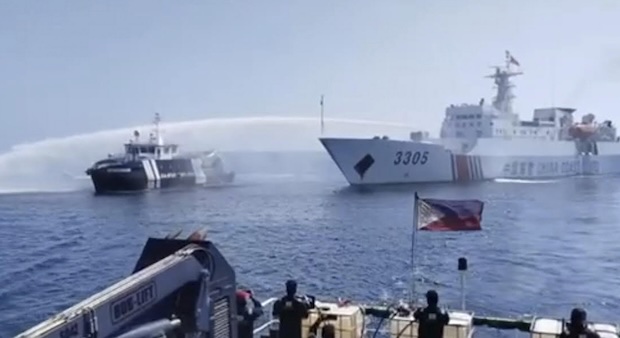
CODE OF CONDUCT | A screengrab from a Dec. 9, 2023, video by the Philippine Coast Guard shows China Coast Guard Vessel No. 3305 firing a water cannon at BRP Datu Bankaw, a patrol vessel of the Bureau of Fisheries and Aquatic Resources, near Scarborough Shoal (Bajo de Masinloc)
MANILA, Philippines — Foreign ministers of the Association of Southeast Asian Nations (Asean) have expressed concern over escalating tensions in disputed areas in the South China Sea, including the West Philippine Sea, and called on all the parties involved to exercise restraint and pursue a peaceful resolution of disputes in the region.
“We closely follow with concern the recent developments in the South China Sea that may undermine peace, security, and stability in the region,” the top diplomats of Southeast Asia’s regional bloc said in a statement late Saturday also issued by the Department of Foreign Affairs.
The statement came after China and the Philippines in recent months traded accusations over a series of maritime run-ins, while President Ferdinand Marcos Jr. cited the need to change the country’s approach since diplomatic efforts were headed in a “poor direction,” he said last month.
China, in recent days, has also noticeably intensified its public responses to persistent challenges against its sweeping claims over the South China Sea, particularly from the Philippines, denying and dismissing all allegations made by Manila in their maritime dispute.
‘Sea of peace, stability’
Asean officials underscored the need to maintain and promote freedom of navigation in and overflight above the maritime sphere of Southeast Asia.
“We reaffirm the need to restore and enhance mutual trust and confidence as well as exercise self-restraint in the conduct of activities that would complicate or escalate disputes and affect peace and stability, [and] avoid actions that may further complicate the situation,” they noted.
The ministers are pushing for a peaceful resolution of disputes, “including full respect for legal and diplomatic processes, without resorting to threat or use of force,” in accordance with universally recognized principles of international law, including the 1982 United Nations Convention on the Law of the Sea (Unclos).
The foreign ministers also reiterated the importance of peaceful dialogue “that contributes constructively to the promotion of regional stability and cooperation in the maritime domain.”
“We welcome the efforts to manage the situations and ensure that peace and stability are maintained. We recognize the benefits of having the South China Sea as a sea of peace, stability, cooperation, and prosperity,” they pointed out.
“We underscored the importance of the full and effective implementation of the Declaration on the Conduct of Parties in the South China Sea in its entirety and committed to working towards the early conclusion of an effective and substantive Code of Conduct in the South China Sea,” the foreign ministers added.
Separate code
The officials also welcomed the recent holding of a maritime dialogue between China and the United States in Beijing and the meeting between US President Joe Biden and China’s leader Xi Jinping on the sidelines of the Asia-Pacific Economic Cooperation Leaders’ Summit in California last November.
“We hope that such dialogues will continue to further Asean’s efforts to strengthen stability and cooperation in the region’s maritime sphere,” they said.
“We reaffirm our unity and solidarity and our shared commitment to maintaining and further strengthening stability in our maritime sphere to bring about overall peace, security, stability, and prosperity in our region,” they added.
Mr. Marcos said in November that the Philippines was working on a separate code of conduct with neighboring countries such as Malaysia and Vietnam regarding their territorial conflicts in the South China Sea as a broader agreement with China has not been progressing.
Asean and China have worked toward creating a code of conduct in the South China Sea, a plan dating back to 2002, although the regional bloc had already broached that proposal a decade earlier and officially endorsed it in 1996.
But progress has been slow despite expressions of commitment by concerned parties to advance and speed up the process.
Talks on the components of the code have yet to start amid concerns over China’s willingness to commit to a binding set of rules consistent with international law.
China claims most of the South China Sea through a “nine-dash-line” that loops as far as 1,500 kilometers south of its mainland, cutting into the exclusive economic zones of the Philippines, Brunei, Indonesia, Malaysia, and Vietnam.
It updated its claim last August into a 10-dash line covering almost the entire West Philippine Sea.